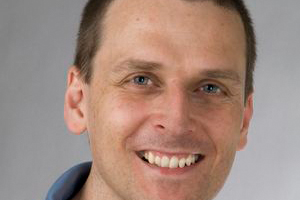In neurological disease such as epilepsy or Parkinson’s disease, changes of the electrical activity occur in the brain, which may result in impaired movement or limited long-term memory. Dirk Isbrandt aims to unravel the causes and mechanisms of these diseases, with a clear focus on the patients. Based on human disease, he investigates disease mechanisms in model organisms, with the aim to find new therapeutic approaches. If these are successful in animal models, the goal is that results are quickly transferred into clinical application to the benefit of patients. The 45-year-old physician investigates the effects of dysfunctions in nerve cell networks on cognitive performance. Moreover, he analyses how changes in energy metabolism affect the function of individual nerve cells and their networks.
“The Cologne/Bonn region is an attractive scientific environment, particularly in the research areas of epilepsy, Parkinson’s disease and nerve cell networks,” says Isbrandt. He has already been cooperating with a number of research groups at the Universities of Cologne and Bonn as well as the DZNE and now wishes to strengthen these partnerships. However, he also envisions new scientific interactions. “The work of Prof. Fink’s clinical research group of the DFG, the MPI for Biology of Ageing and the CECAD Excellence Cluster fit very well with my research interests. With regard to the DZNE, I also find it interesting that it is spread across several locations in Germany and linked with numerous neurological clinics. This creates synergistic effects and also facilitates an efficient transfer of scientific results to the patient.”
Dirk Isbrandt and his working group will be accommodated on the campus of the University of Cologne. Isbrandt’s appointment will strengthen collaborations in the area of neurological research in the Cologne/Bonn region. Isbrandt advocates the concept of universities and non-university research institutions working together. “Everyone benefits from this concept! The region has made a very dynamic impression on me, firstly because the University of Cologne has become an Elite University and investments are actively being made in new buildings and new appointments,” says Prof. Isbrandt. Secondly, the DZNE provides extraordinary research opportunities through its interdisciplinary multi-site approach and as being part of the Helmholtz Association. “All in all, I see excellent perspectives here for my research.”
Prof. Axel Freimuth, Rector of the University of Cologne, and Prof. Pierluigi Nicotera, DZNE’s Scientific Director and Chairman of the Executive Board, both welcome this step towards closer collaboration. Both agree that joint appointments are especially attractive for natural scientists and physicians. This is because the university and the DZNE each offer different yet complementary opportunities.
Dirk Isbrandt previously worked for the Center for Molecular Neurobiology at the University Medical Center Hamburg-Eppendorf, where he held a Heisenberg Professorship in Experimental Neuropaediatrics/Neurophysiology of the German Research Foundation (DFG). He obtained his medical degree and doctorate from the Georg-August-Universität in Göttingen. Afterwards he worked at the University Medical Center Hamburg-Eppendorf and in the laboratory of Prof. G. Buzsáki at Rutgers University, Newark, NJ, USA. In 2008, he was offered both the DFG-Heisenberg Professorship and the post of “Directeur de Recherche“ at the “Institut national de la santé et de la recherche médicale” in France. He accepted the Heisenberg Professorship. On October 1, Isbrandt was appointed Professor of Experimental Neurophysiology at the University of Cologne, and will head a research group of the same title at the DZNE. As part of his research professorship, he will also be involved Master’s/graduate and postgraduate training.

